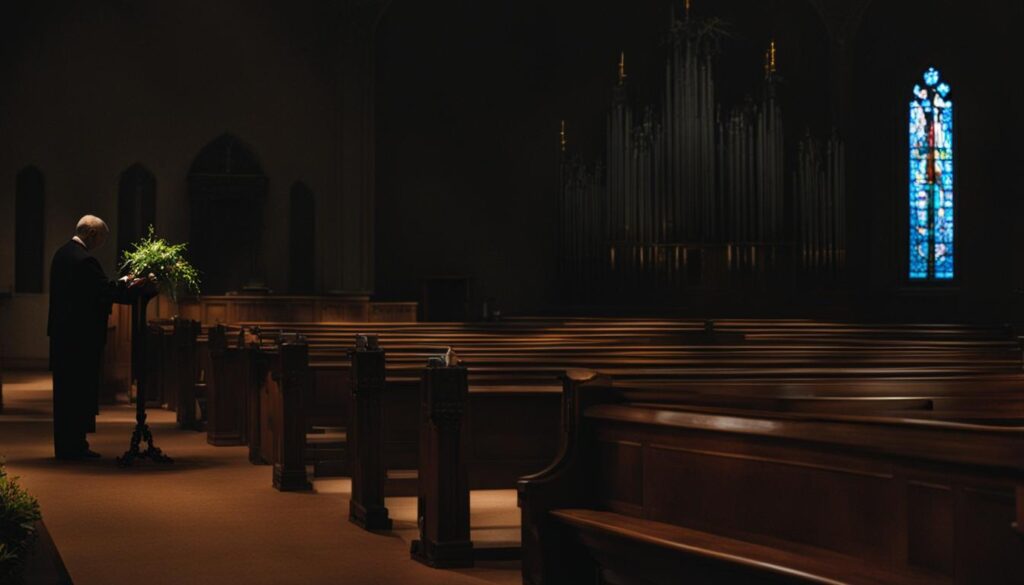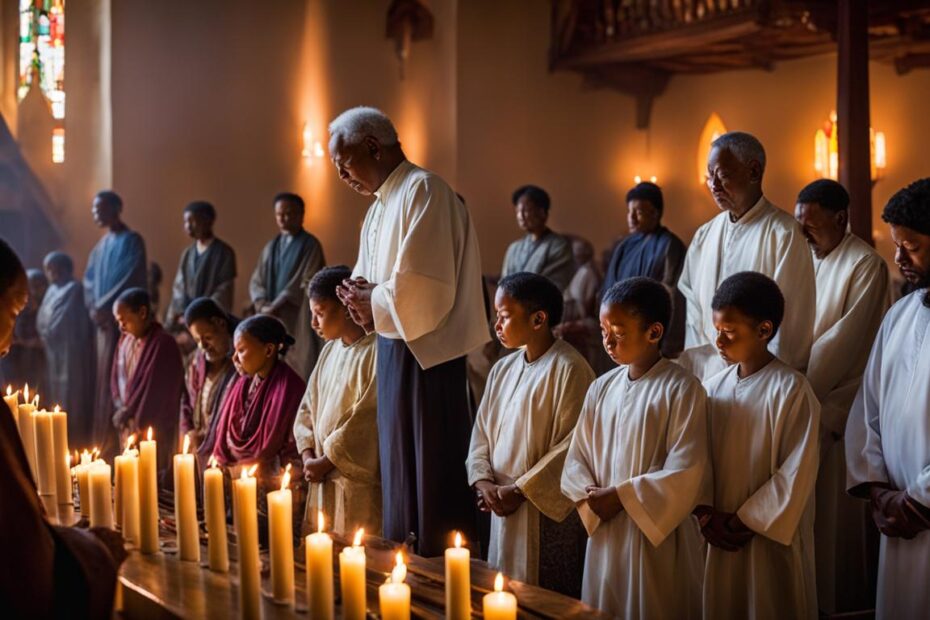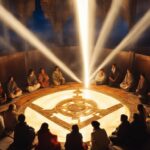Welcome to the world of worship, where the divine meets the earthly, and hearts are uplifted in reverence and praise. In this article, we will explore the sacred practice of invocation in a worship service – a prayer that sets the tone, creates a spiritual connection, and invites the presence of the Divine.
An invocation worship service is more than just an opening prayer; it is a divine calling, a humble plea, and a deep expression of faith. Through rituals, blessings, and spiritual guidance, it offers worshippers a profound opportunity to connect with something greater than themselves.
Whether you are a worship leader, a member of a congregation, or simply curious about this sacred practice, this article will provide you with the guidance and inspiration you need to make your worship service a truly meaningful and transformative experience.
Key Takeaways:
- An invocation worship service is a prayer that opens a church service or meeting.
- It sets the tone, creates a spiritual connection, and invites the presence of the Divine.
- Invocation prayers acknowledge God’s presence, seek His guidance, and unify the congregation.
- Elements of an invocation prayer include worship, gratitude, and specific requests for blessings.
- Crafting an invocation prayer requires intention, reverence, and personalization.
Understanding the Importance of Invocation Prayers
Invocation prayers hold significant importance in worship services, serving as a powerful tool for creating a sacred atmosphere and fostering a deeper connection with the divine. These prayers hold immense significance, showcasing the purpose and benefits they bring to worship gatherings.
One of the key purposes of invocation prayers is to acknowledge the presence of God. By starting a worship service with an invocation prayer, worshippers are reminded of God’s existence and His role in their lives. This acknowledgement cultivates a sense of reverence, humility, and expectation among the congregation, setting the tone for the rest of the worship experience.
Moreover, invocation prayers also serve as a means to seek divine guidance. By inviting God’s presence and blessings, worshippers express their trust and reliance on Him. This act of surrender creates an opportunity for worshippers to find solace, clarity, and direction in their spiritual journey.
In addition to these spiritual benefits, invocation prayers also help unify the congregation. As worshippers join together in prayer, they form a collective intention and a shared sense of purpose. This unity fosters a deeper sense of community and allows individuals to experience the power of worship in a more profound way.
Table: Benefits of Invocation Prayers
| Benefits | Description |
|---|---|
| Creating reverence | Invocation prayers establish a sacred atmosphere, evoking a sense of awe and respect for the divine. |
| Fostering guidance | By seeking God’s presence and blessings, invocation prayers provide an opportunity for spiritual guidance and direction. |
| Unifying the congregation | Through collective prayer, invocation helps to unite worshippers, cultivating a shared sense of purpose and community. |
“Invocation prayers create a bridge between the earthly and the divine, enabling worshippers to experience the presence and guidance of God in a profound and transformative way. They serve as a powerful reminder of our humble place in the universe and the importance of seeking divine connection in our worship.”
Understanding the significance and purpose of invocation prayers allows worshippers to engage in worship services with a deeper level of intention and awareness. By recognizing their importance, individuals can fully embrace the transformative power of invocation prayers and experience a more meaningful and impactful worship experience.
Elements of an Invocation Prayer
An invocation prayer is a sacred and meaningful way to open a worship service or meeting, connecting worshippers with the divine. It incorporates various elements that enhance the spiritual experience and set the tone for the gathering. Understanding the structure and components of an invocation prayer can help worship leaders craft a heartfelt and authentic prayer that resonates with the congregation.
The elements of an invocation prayer typically include:
- Acknowledging God’s greatness: This element recognizes the majesty, power, and glory of God, expressing reverence and awe.
- Expressing gratitude: Gratitude is an essential part of an invocation prayer, offering thanks for God’s blessings, love, and presence.
- Inviting the Holy Spirit: Invoking the presence of the Holy Spirit creates a spiritual atmosphere and invites divine guidance for the worship service.
- Making petitions: The petition element involves specific requests for God’s blessings, guidance, and intervention in the lives of worshippers.
These elements can be customized and arranged based on the specific needs and focus of the worship service, creating a unique invocation prayer that resonates with the congregation’s hearts and minds.
Structure of an Invocation Prayer
While the structure of an invocation prayer may vary, it generally follows a logical flow that leads worshippers into a sacred space. Here is a suggested structure:
- Address and greeting: Begin the prayer by addressing God, using titles like “Heavenly Father” or “Most High God,” and expressing reverence and love.
- Acknowledgment and adoration: Acknowledge God’s greatness, power, and majesty, emphasizing His role as the creator and sustainer of all things.
- Gratitude and thanksgiving: Express heartfelt gratitude for God’s blessings, love, and faithfulness, highlighting specific reasons for thanksgiving.
- Petitions and intercessions: Present specific requests for God’s guidance, wisdom, healing, and provision, both for the worship service and the needs of the congregation.
- Closing and benediction: Conclude the prayer by affirming faith in God’s goodness, expressing trust in His presence and provision, and offering a blessing for the worship service and the worshippers.
By following this structure and incorporating the essential elements, an invocation prayer can create a profound and transformative worship experience for both the worship leader and the congregation.
How to Craft an Invocation Prayer for Worship Service
Crafting an invocation prayer for a worship service is a sacred task that requires careful thought and intention. The prayer sets the tone for the entire service, creating a spiritual connection with the divine and inviting God’s presence and guidance. Here are some steps to help you craft a meaningful invocation prayer:
1. Start with a clear intention
Before you begin writing the prayer, take a moment to reflect on the purpose and focus of the worship service. What is the theme or message? What needs or intentions do you want to express on behalf of the congregation? Starting with a clear intention will help guide your words and ensure that the prayer resonates with the worshippers.
2. Express reverence, gratitude, and surrender
An invocation prayer should begin by acknowledging God’s greatness and majesty. Express gratitude for His presence and blessings in the lives of the worshippers. Surrender to His will and guidance, recognizing that He is the ultimate source of wisdom and strength.
3. Keep it concise, yet heartfelt
While it’s important to express your thoughts and intentions clearly, it’s also essential to keep the prayer concise. Avoid unnecessary repetition or lengthy explanations. Instead, focus on heartfelt words that capture the essence of your intentions and invite the worshippers into a deeper spiritual connection.
4. Personalize and incorporate relevant scriptures or hymns
To make the invocation prayer more personal and meaningful, consider incorporating relevant scriptures or hymns. Choose passages that align with the theme or message of the worship service. By including these elements, you can deepen the spiritual experience for the congregation and provide a foundation for reflection and meditation.
Remember, crafting an invocation prayer is a privilege and an opportunity to lead the congregation into a sacred space of worship. By approaching it with sincerity, reverence, and a sincere desire to connect with the divine, you can create a prayer that sets the tone for a meaningful and transformative worship service.
Examples of Invocation Prayers for Worship Service
Here are a few examples of invocation prayers that can be used in a worship service:
-
Invocation Prayer for Guidance:
Almighty God, we gather in your presence today, seeking your divine guidance. As we begin this worship service, we humbly ask for your wisdom and discernment to lead us in the right path. Fill our hearts with your love, and guide every step we take with your truth. May this time of worship be a sacred space where we encounter your presence and receive your blessings. In your holy name we pray, amen.
-
Invocation Prayer for Unity:
Heavenly Father, we come before you as a community of believers, united in our love for you. We lift our voices in unison, seeking your divine presence to bind us together in harmony and love. Help us to lay aside our differences and embrace one another with compassion and grace. As we worship you today, may our hearts be filled with a deep sense of unity and may your Spirit move in our midst. In your precious name we pray, amen.
-
Invocation Prayer for Healing:
O Lord, our Healer, we come before you with heavy hearts, seeking your healing touch. We lift up all those who are hurting, both physically and emotionally, and ask for your comfort and restoration. Pour out your healing power upon us, Lord, and bring wholeness to our brokenness. As we gather in worship, may your love and healing presence envelop us, bringing hope and renewal. We place our trust in you, knowing that you are the great Physician. In Jesus’ name, we pray, amen.
These are just a few examples of invocation prayers that can be tailored to fit the specific needs and context of a worship service. They serve as a starting point, providing inspiration and guidance as worship leaders craft their own heartfelt prayers.

The Power of Invocation in Worship
Invoking the divine presence through prayer holds immense power in the context of worship. It goes beyond mere words and rituals; it creates a spiritual atmosphere that elevates the worship experience. When worshippers gather to invoke the divine, they enter into a sacred space filled with reverence, gratitude, and surrender. The act of invocation opens doors to divine guidance, blessings, and spiritual transformation.
Invocation prayer has a profound impact on worshippers, as it invites them to connect with something greater than themselves. It sets the stage for a deep spiritual encounter and fosters a sense of unity among the congregation. Through invocation, worshippers are reminded of their purpose and their relationship with the divine. It is a powerful reminder that they are part of something bigger and that their worship extends beyond the physical realm.
In the journey of worship, invocation acts as a catalyst for personal and collective growth. It stirs the emotions, stirs the spirit, and opens the heart to receive divine messages. The power of invocation lies in its ability to uplift, inspire, and transform lives. It creates a space for reflection, introspection, and connection, allowing individuals to tap into their innermost selves and experience a profound spiritual connection with the divine.
The Impact of Invocation in Worship
The impact of invocation in worship goes beyond the immediate moment; it extends into the lives of the worshippers. When individuals engage in heartfelt invocation, they open themselves up to receive divine guidance, wisdom, and blessings. They become more receptive to spiritual insights and are empowered to live a life aligned with their spiritual values.
Different Cultural and Religious Traditions of Invocation
Invocation practices vary across different cultures and religious traditions. Each tradition brings its own unique customs, rituals, and beliefs to the act of invoking the divine. These diverse forms of invocation reflect the rich tapestry of human spirituality and the universal human desire to connect with a higher power.
In many Eastern cultures, such as Hinduism and Buddhism, invocation is often accompanied by elaborate rituals and ceremonies. Chants, incense, and offerings are used to invoke the presence of deities and seek their blessings. These practices create a sense of sacredness and evoke a deep spiritual connection with the divine.
In Western religious traditions, such as Christianity and Judaism, invocation is often incorporated into formal worship services. Prayers of invocation may be recited by religious leaders or members of the congregation, invoking the presence of God and seeking His guidance. These invocations can be spontaneous or scripted, but they serve the purpose of setting the tone for the worship service and creating a reverent atmosphere.
| Cultural Traditions | Religious Practices |
|---|---|
| Eastern cultures | Elaborate rituals and ceremonies |
| Western traditions | Incorporated into formal worship services |
“The diverse forms of invocation reflect the rich tapestry of human spirituality and the universal human desire to connect with a higher power.”
Indigenous cultures around the world also have their own unique forms of invocation. These may involve drumming, dancing, or other sacred practices that seek to establish a connection with the spirit world. These invocations are often deeply rooted in the cultural traditions and ancestral wisdom of the indigenous communities.
Regardless of the specific cultural or religious tradition, invocation serves as a means of expressing reverence, gratitude, and seeking divine guidance. It is a powerful practice that transcends boundaries and unites individuals in their shared yearning for a deeper spiritual connection.

Enhancing the Worship Experience through Invocation Prayers
Invocation prayers play a significant role in elevating the worship service and deepening the spiritual connection between worshippers and the divine. By incorporating these prayers, the worship experience is enhanced, creating a sacred atmosphere that fosters reverence, gratitude, and surrender.
Through invocation prayers, worshippers are invited to set aside distractions and focus their hearts and minds on God. The act of invoking the divine presence prepares the congregation for a transformative encounter with the sacred.
Invocation prayers also serve to unite the worshippers, creating a sense of collective purpose and shared spiritual journey. As the congregation joins together in expressing reverence, gratitude, and surrender, a powerful sense of community is fostered, allowing for a deeper level of worship and connection with the divine.
Table: The Benefits of Incorporating Invocation Prayers
| Benefits | Description |
|---|---|
| Enhanced Reverence | Invocation prayers cultivate an atmosphere of reverence, setting the tone for a sacred worship experience. |
| Deeper Spiritual Connection | Invoking the divine presence fosters a deeper spiritual connection, allowing for a more meaningful and transformative worship experience. |
| Focus on God | By starting the worship service with an invocation prayer, the focus is shifted towards God, helping worshippers to center their thoughts on the divine. |
| Collective Unity | Invocation prayers bring the congregation together in a shared act of reverence, gratitude, and surrender, fostering a sense of unity and community. |
| Spiritual Preparation | Through invocation prayers, worshippers are spiritually prepared for the worship service, enabling them to engage more fully in the sacred moments that follow. |
Overall, incorporating invocation prayers into the worship service enhances the entire experience, elevating it to a higher spiritual plane. It creates an atmosphere of reverence, deepens the connection with the divine, and fosters a sense of unity among the worshippers. By embracing the power of invocation, worship services can become transformative encounters with the sacred.
Incorporating Invocation in Different Types of Worship Services
Invocation prayers can be a meaningful addition to various types of worship services, whether traditional or contemporary. By incorporating an invocation prayer, worshippers can deepen their spiritual connection and create a reverent atmosphere. Here are some examples of how invocation can be incorporated in different types of worship services:
1. Traditional Worship:
In traditional worship services, invocation prayers often follow a structured format that aligns with the order of the service. They can be led by a clergy member or a designated worship leader. The prayer may include elements of reverence, gratitude, and a call for God’s guidance and presence. It sets the tone for the entire service and helps congregants transition into a mindset of worship and devotion.
2. Contemporary Worship:
In contemporary worship services, invocation prayers can take on a more informal and spontaneous tone. They can be incorporated at the beginning of the service or as a transition between songs or segments of the worship experience. Contemporary invocation prayers often focus on inviting the Holy Spirit’s presence, acknowledging God’s goodness, and expressing a desire for a deeper connection with Him.
3. Special Worship Events:
Invocation prayers can also be tailored to suit special worship events or gatherings. For example, during a themed worship night focused on healing and restoration, the invocation prayer may emphasize God’s healing power and the congregation’s surrender to His will. Similarly, during a worship concert or conference, the invocation prayer can energize and align the hearts of participants before they engage in worship through music and teaching.
Remember, the key is to adapt the invocation prayer to the specific context and purpose of the worship service. Whether it’s a traditional, contemporary, or special worship event, incorporating an invocation prayer adds depth, meaning, and reverence to the overall worship experience.
Key Takeaways:
- Invocation prayers can be incorporated into different types of worship services, such as traditional, contemporary, and special events.
- In traditional worship, invocation prayers follow a structured format and set the tone for the entire service.
- In contemporary worship, invocation prayers can be more informal and spontaneous, focusing on inviting the Holy Spirit’s presence.
- For special worship events, the invocation prayer can be tailored to the theme or purpose of the gathering.
- Adapting the invocation prayer to the specific context enhances the worship experience and fosters a deeper spiritual connection.
The Sacred Role of the Worship Leader in Invocation Prayers
The worship leader in any religious gathering holds a sacred role in leading the congregation in the invocation prayer. They serve as a facilitator, guiding worshippers into a mindset of reverence, gratitude, and surrender. With their words, demeanor, and personal connection to the divine, worship leaders create an atmosphere of expectation and invite the presence of God.
The responsibilities of a worship leader in prayer go beyond simply reciting words. They must lead with authenticity, humility, and a deep sense of spiritual connection. The role requires a strong understanding of the purpose and significance of invocation prayers, as well as the ability to connect with the congregation on a deep level.
Leading the invocation in a worship service involves setting the tone for the entire service and creating a space for worshippers to enter into a sacred and reverent atmosphere. The worship leader’s words and presence have the power to inspire, uplift, and transform lives. Through their guidance, the congregation is enabled to engage emotionally, spiritually, and intellectually in the worship experience.
Ultimately, the worship leader plays a vital role in helping the congregation connect with the divine. They have the responsibility of leading by example, cultivating a genuine sense of reverence, and creating a space for worshippers to experience the presence and blessings of God. By embracing this role with authenticity and humility, worship leaders can profoundly impact the worship service and foster a deep spiritual connection among the worshippers.
Responsibilities of the Worship Leader in Prayer:
- Setting the tone for the worship service
- Creating an atmosphere of reverence and expectation
- Guiding worshippers into a mindset of gratitude and surrender
- Invoking the presence and blessings of God
- Leading with authenticity and humility
- Cultivating a deep spiritual connection with the congregation
Conclusion
Invocation prayers are a vital part of the worship experience, bringing worshippers into a sacred space of reverence, gratitude, and surrender. They have the power to elevate the spiritual connection, invite divine guidance, and transform lives. By understanding the significance and purpose of invocation prayers, crafting them with intention and authenticity, and incorporating them into different types of worship services, worshippers can truly immerse themselves in a divine journey of worship and spiritual growth.
FAQ
What is an invocation prayer?
An invocation prayer is a prayer for opening a church service or meeting. It typically includes elements of worship and petition, expressing reverence for God and requesting His presence and blessing.
Why are invocation prayers important in worship?
Invocation prayers serve the purpose of acknowledging God’s presence, seeking His guidance, and unifying the congregation. They create a sense of reverence, humility, and expectation among worshippers, and provide an opportunity to express gratitude, surrender, and seek blessings from the Divine.
What elements are typically included in an invocation prayer?
An invocation prayer typically includes elements of worship, such as acknowledging God’s greatness and majesty, expressing gratitude, and inviting the presence of the Holy Spirit. It also includes elements of petition, where specific requests are made for God’s blessings and guidance.
How do you craft an invocation prayer for a worship service?
Crafting an invocation prayer requires thoughtful consideration of the specific worship service and the needs of the congregation. It is important to start with a clear intention, expressing reverence, gratitude, and surrender. The prayer should be concise, yet heartfelt, focusing on inviting the presence of God and seeking His guidance. Personalizing the prayer and incorporating relevant Scriptures or hymns can add depth and meaning to the invocation.
Can you provide examples of invocation prayers for a worship service?
Sure! Here are a few examples of invocation prayers for a worship service:
What is the power of invocation in worship?
The power of invocation in worship lies in its ability to create a sacred and reverent atmosphere, fostering a deeper connection with the divine. Invocation prayers have the potential to inspire, uplift, and transform lives, as they open up channels for divine guidance, blessings, and spiritual growth.
Do different cultures and religions have different practices of invocation?
Yes, invocation practices vary across different cultures and religious traditions. Some involve specific rituals, chants, or incantations, while others may be more spontaneous and personal expressions of faith. However, the underlying purpose remains the same – seeking a connection with the divine and invoking blessings and guidance.
How can invocation prayers enhance the worship experience?
Invocation prayers help create a sacred atmosphere, set the focus on God, and prepare the hearts and minds of worshippers. By incorporating elements of worship and petition, they deepen the spiritual connection and foster a sense of unity among the congregation. Invocation prayers invite the presence of God and create a space for personal and collective transformation.
Can invocation prayers be incorporated into different types of worship services?
Yes, invocation prayers can be adapted to suit various types of worship services, whether traditional or contemporary. They can be personalized to match the style, theme, or focus of the worship service. Incorporating an invocation prayer adds depth, meaning, and reverence to the worship experience.
What is the role of the worship leader in leading an invocation prayer?
The worship leader plays a sacred role in leading the congregation in the invocation prayer. They serve as a facilitator, guiding worshippers into a mindset of reverence, gratitude, and surrender. The worship leader sets the tone, creates an atmosphere of expectation, and invites the presence of God through their words, demeanor, and personal connection to the divine.








